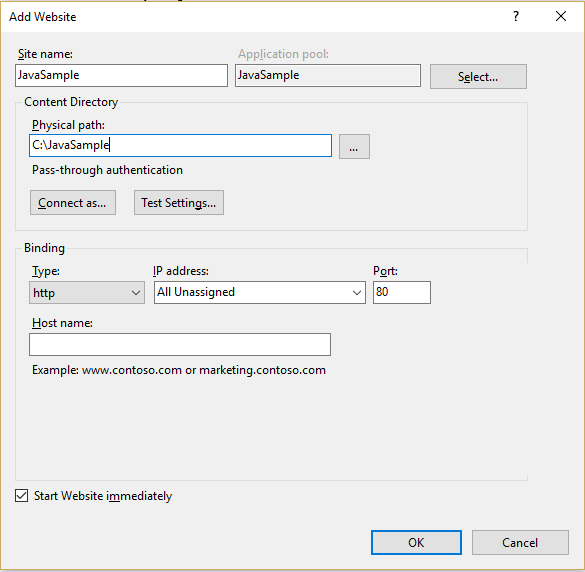Understanding IIS HTTPPlatformHandler using Tomcat 8
In this article we will understand how to setup HTTPPlatformHandler using Tomcat 8.
Note: In my below example I have used some hard coded value for simplicity for viewer to follow and can be changed based on the need.
Step 1: Download Tomcat 8
Go to the URL https://tomcat.apache.org/download-80.cgi and download the zipped package to any of your choice directory, let’s say “C:\JavaSample\bin”.
Once you download the zip file, you can extract into the same location “C:\JavaSample\bin\apache-tomcat-8.0.28\apache-tomcat-8.0.28" which I would refer this as my Tomcat Installation directory called as “TOMCAT_HOME” or CATALINA_HOME.
Catalina is codename for Tomcat 5 and above.
Step 2: Download and Install Java Development Kit
Go to URL https://www.oracle.com/technetwork/java/javase/downloads/jdk8-downloads-2133151.html and download Java development kit 8 for windows based on the bitness of the machine.
Step 3: Creating Environmental Variables for Windows
- Create an Environmental Variable called CATALINA_HOME with value as your Tomcat installation directory. In my example I have created a server variable CATALINA_HOME= C:\JavaSample\bin\apache-tomcat-8.0.28\apache-tomcat-8.0.28.
To confirm open command prompt and check if it has been set correctly.
- Take a note of location where your Java Development(JDK) is installed and create a environmental variable called “JAVA_HOME” and set the value to the JDK installed directory. In my example I have set JAVA_HOME=”C:\Program Files\Java\jdk1.8.0_65".
To confirm open command prompt and check if it has been set correctly.
Step 3: Configure Apache Tomcat Server
There are few configuration changes required to setup Tomcat server and in our case we will be changing below files under %CATALINA_HOME%\Conf:
- Server.xml
- Web.xml
- Context.xml
Open server.xml under %CATALINA_HOME%\conf and change the settings as high lightened in yellow:
<Connector port="${port.http}" protocol="HTTP/1.1" connectionTimeout="20000" redirectPort="8443" />
|
Open web.xml under %CATALINA_HOME%\conf and change the settings as high lightened in yellow:
<servlet> <servlet-name>default</servlet-name> <servlet-class>org.apache.catalina.servlets.DefaultServlet</servlet-class> <init-param> <param-name>debug</param-name> <param-value>0</param-value> </init-param> <init-param> <param-name>listings</param-name> <param-value>true</param-value> </init-param> <load-on-startup>1</load-on-startup> </servlet>
|
Open context.xml under %CATALINA_HOME%\conf and change the settings as high lightened in yellow:
<Context reloadable="true">
|
Step 4: Deploy a Java Servlet
In my case, I have used one of the open source Java Servlet and download the code from https://pebble.sourceforge.net/ and copy the pebble.war from the source code to %CATALINA_HOME%\webapps
Step 5: Configure IIS
- Install the HttpPlatformHandler – WebPI/x86/x64.
- Create a website and complete the site as below settings:
- Create a web.config under your website folder which is c:\JavaSample\web.config and add the httpPlatformHandler configuration as below.
<?xml version="1.0" encoding="UTF-8"?> <configuration> <system.webServer> <handlers> <add name="httpplatformhandler" path="*" verb="*" modules="httpPlatformHandler" resourceType="Unspecified" /> </handlers> <httpPlatform processPath="C:\JavaSample\bin\apache-tomcat-8.0.28\apache-tomcat-8.0.28\bin\startup.bat" arguments="" stdoutLogEnabled="true" stdoutLogFile="\\?c:\JavaSample\log.txt"> <environmentVariables> <environmentVariable name="JRE_HOME" value="%programfiles%\java\jdk1.8.0_65" /> <environmentVariable name="CATALINA_HOME" value="c:\JavaSample\bin\apache-tomcat-8.0.28\apache-tomcat-8.0.28" /> <environmentVariable name="CATALINA_OPTS" value="-Dport.http=%HTTP_PLATFORM_PORT% -Dsomeotherconfig=value" /> </environmentVariables> </httpPlatform> </system.webServer> </configuration>
|
Now open a browser and browse https://localhost which should show the default Tomcat server's welcome page and then browse https://localhost/pebble which should show the website which is deployed under webapps which is served from Tomcat server.
References:
https://www.ntu.edu.sg/home/ehchua/programming/howto/Tomcat_HowTo.html
Comments
- Anonymous
November 27, 2015
Very useful info


